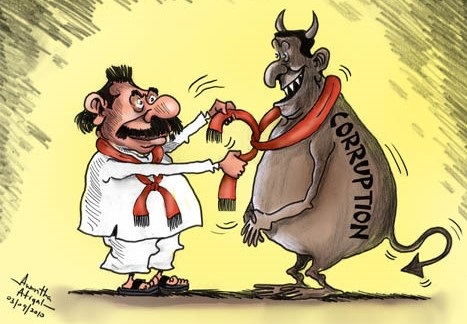- CB issues shocking report on money laundering; points out lack of prosecution
(By Namini Wijedasa/Sunday Times)
Bribery and corruption are now the second most significant unlawful activity that generates criminal proceeds in the country and has shot up three places from fifth position in 2014, reveals the National Money Laundering and Terrorist Financing Risk Assessment released this week by the Central Bank’s Financial Intelligence Unit (FIU).
“Although the incidents reported (complaints) were high, the raids and investigations subsequently carried out result in a much lower number of prosecutions,” the report states. “Due to the absence of ML [money laundering] investigations, no ML cases are reported linked to bribery and corruption offences.”
The report observes that national data on these offences were scanty. “During the assessed period, apparent scenarios of grand bribery and corruption events are not adequately reflected in the statistics of investigations carried out,” it observes.
The first and third most significant unlawful activities generating criminal proceeds are drugs and psychotropic substance trafficking and Customs-related offences, respectively. The usage of drugs has now widened in Sri Lanka from heroin and cannabis to several new types of narcotic drugs and psychotropic substances such as LSD, crystal meth (ice) and cocaine, the report identifies.
With regard to Customs, NRA (the national risk assessment) infers that trade-related activities during the relevant period “would have generated around Rs. 14.5 billion in illegal proceeds”. The misuse of trade-based instruments such as letters of credit and open account terms in international trade indicated “significant involvement of the banking sector”.
Separately, significant challenges faced by the foreign exchange market and the managed exchange rate since 2019 led to informal money value remittances called “hawala” and “undial”, both inward and outward. These were potent indicators of large-value criminal proceeds and a likely presence of money laundering precursors, the report observes.
The NRA identifies a serious loophole in the ML investigation process related to taxes. While financial crimes are offences in Sri Lanka, tax evasion is not a predicate offence under the country’s AML/CFT regime. Therefore, even law enforcement agencies do not have the power to access information held by the Inland Revenue Department when they investigate crimes related to money laundering.
A national risk assessment (NRA) is a compulsory requirement of the intergovernmental Financial Action Task Force (FATF), which is seen as the international anti-money laundering (AML) and counter-terrorism financing (CFT) standard setter.
The self-conducted process identifies, analyses and understands the main sources and drivers of these risks in a country. It was coordinated by the FIU, which is the AML/CFT regulator in Sri Lanka. Key government and private sector institutions participated in the NRA under a national committee chaired by the Central Bank Governor.
The NRA rates the money laundering threat of bribery and corruption in Sri Lanka as “medium-high”. This is based on proceeds generated during the assessed period; suspicious transaction reports (documents filed with FIU by financial institutions whenever there was a suspected case of money laundering or fraud); and the “unsubstantiated yet widely accepted belief of high corruption level in the country”.
There were also 10 mutual legal assistance (MLA) requests from Sri Lanka seeking information from other countries on possible offences of bribery and corruption involved with money laundering.
The FATF will now conduct a “mutual evaluation” to assess Sri Lanka for technical compliance with 40 recommendations which are international AML/CFT standards. Accordingly, a team from the Asia Pacific Group (APG) on Money Laundering was in Colombo last week. The APG is one of the FATF’s main regional monitoring bodies.
In 2011 and 2017, following its first and second mutual evaluations, Sri Lanka was placed on the dreaded “grey list” owing to strategic deficiencies in its AML/CFT framework. In 2017, the European Union also blacklisted the country for non-compliance with these international standards. The country exited the grey list in 2019 after addressing some gaps in the legal and institutional framework.
But to avoid being listed again, Sri Lanka will have to take more measures to strengthen its AML/CFT system, the visiting APG delegation pointed out. These include improving implementation by law enforcement, particularly in clearing the backlog of money laundering cases and increasing the scope of asset recovery and money laundering-related activities.
Strengthening anti-bribery and anti-corruption structures in Sri Lanka is also a crucial target of the ongoing International Monetary Fund programme. An IMF governance diagnostic mission that assessed the country’s governance and anti-corruption framework will release its report shortly, helping to identify priority and time-bound reforms to be implemented under the programme.
“At the request from the authorities, GD [governance diagnostic] will examine the severity of corruption in Sri Lanka and identify key governance weaknesses and corruption vulnerabilities that are macro-economically critical,” the IMF has said. “It will also assess the adequacy of the anti-corruption framework and policies given the nature of corruption vulnerabilities and international commitments.”
It will not, however, identify corrupt institutions, individuals or transactions.
